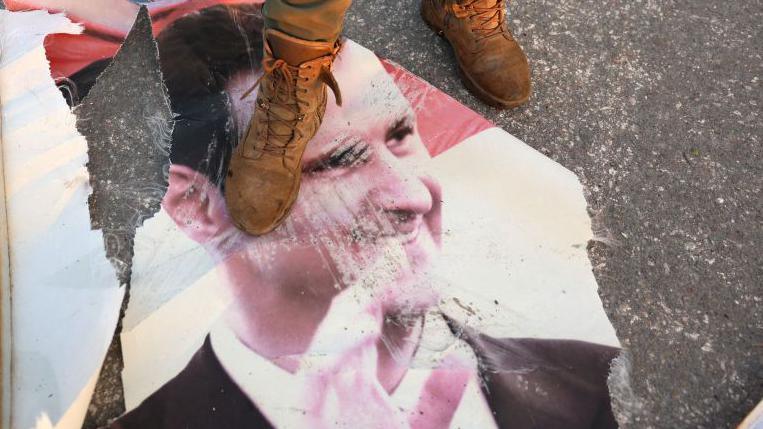Where is Bashar? Rumours swirl in Syria despite official denials

- Published
The mood in Damascus appears to be one of confusion and fear, with many people unable to find out exactly what is going on as rebel factions approach ever closer.
In several suburbs, symbols of the power of the Assad dynasty have been torn down or toppled.
The interior ministry says it's creating a ring of steel around the capital. But government forces have notably failed to provide any such defence in cities, towns and villages that have fallen to rebel factions across the country.
Rumours are swirling over the whereabouts of President Bashar al-Assad, with people logging flights in and out of Damascus to work out whether he might have left.
His office has denied all such reports, saying he's still at work in Damascus, but there has been no sign of him.
Syria has remained a divided country, with the deep scars of the years of civil war unhealed, despite the apparent stalemate and status quo that had been in place for around four years until just a week-and-a-half ago.
Assad's pariah status had come to an end among his fellow Arab leaders, but no progress had been made within Syria towards building a viable future for its people in the aftermath of war.
But the presence of President Assad had seemed to be a seal, however unsatisfactory, on the deadly conflict that had raged for years.
If he is now out of the picture, a power vacuum will re-emerge, with no clear indication of how it will be filled. There is no unified opposition that is in place to take over. The rebel factions have a history of division and internecine fighting.
The group that has spearheaded the new uprising against President Assad has its foundation in the extremism of Al Qaeda. Its leader has tried to reassure other communities in Syria that it will not impose its ideology on them, but they remain understandably apprehensive of what might come.
There will be wider fears that Syria could plunge into an even more calamitous state, with various factions battling each other for control. In an already desperately unstable and volatile region, that could feed more dangerous unrest.
But for now at least, many Syrians both inside and outside the county are united by a hope that many felt they might never experience again - that they might be able to return to their homes, long lost in the bitter war that Assad's violent repression of protest and dissent originally triggered.
Related topics
- Published13 December 2024

- Published8 December 2024
